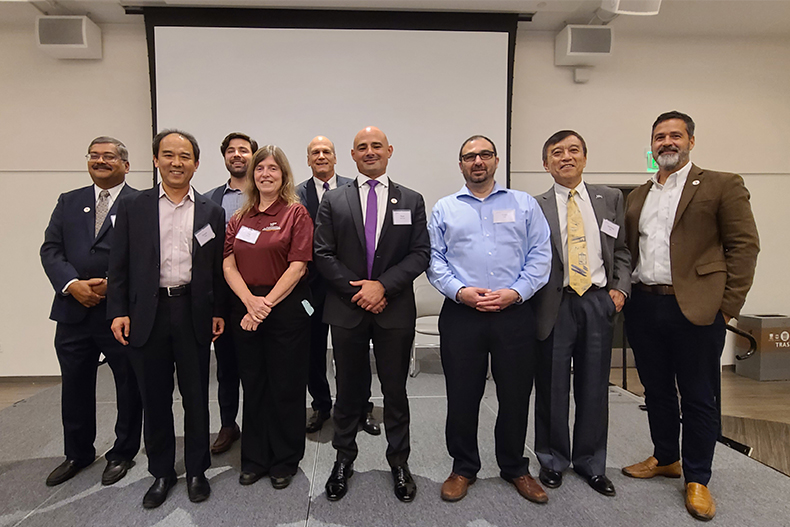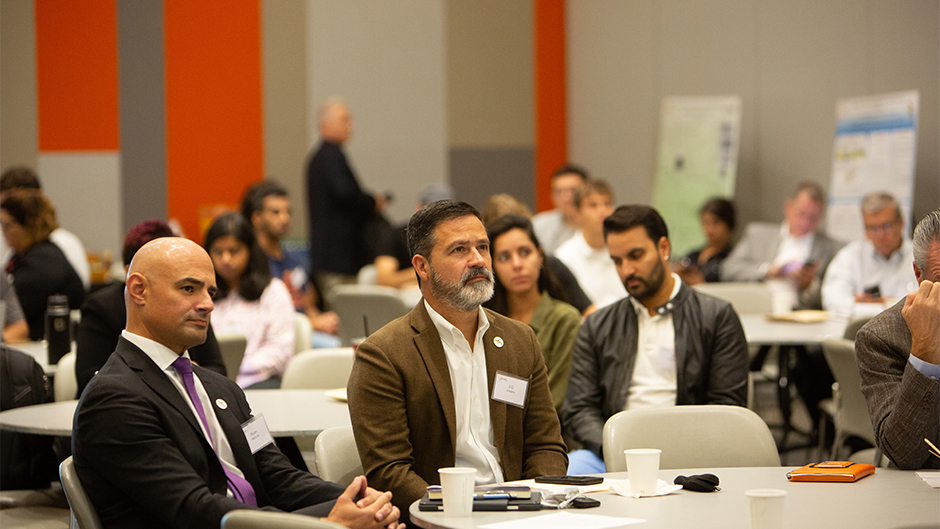As Miami flourishes into a hub for venture capital and urban air mobility innovation, the College of Engineering brought together active researchers and experts in academia, industry, and government for its inaugural Autonomous Mobility Workshop on October 13 and 14, 2022, attended by representatives from American Airlines, Delta Air Lines, Embraer, IBM, Guident, and academic leaders. The event was sponsored by Eve Air Mobility
Provost Jeffrey Duerk and Dean Pratim Biswas opened the workshop with forward-looking remarks on the leading role academia can play in the future of autonomous mobility.
The inaugural workshop saw the launch of the Miami Engineering Autonomous Mobility Initiative (MEAMI). “MEAMI will establish a world-class consortium of leaders in academia, industry, and government to tackle the technological and social challenges of advanced air mobility (AAM)” said Biswas. “Our goal is to best prepare our students to approach problems in innovative ways, integrating them into cutting-edge projects while they are still in college. Industry partners can join MEAMI to benefit from Miami Engineering’s best and brightest, informing our curriculum as well to make sure students become lifelong learners that can lead and adapt to revolutionary changes in the workforce.”

Gecheng Zha, Ph.D., Professor in the Department of Mechanical and Aerospace Engineering, is among the Miami Engineering faculty members spearheading MEAMI. His presentation–Next Generation High Performance eVTOL Enabled by CoFlow Jet–focused on the technological needs to reach the next stage of advanced air mobility.
“At the College,” Zha said, “we seek to create electric vertical/short take-off and landing (eV/STOL) aircraft technology that can provide safe, low-noise, efficient transportation with buy-in from the public and the private sector."
As Ella Atkins, Ph.D., Chair of the Department of Aerospace at the Virginia Tech University College of Engineering, clarified at the outset of her presentation, autonomy is best understood as a spectrum. Atkins sees autonomous mobility in aviation as the pursuit of increasingly autonomous systems–the more that can be automated, the better job human pilots can do.
Atkins described a two-pronged approach to connecting tomorrow’s cities by short trips in aerial vehicles: create precise 3D maps of the city and equip tomorrow’s aerial vehicles with the sensors to perceive real-time, impermanent obstacles like raised cranes.
Other presentations included New NASA Technologies for Airborne Sensing and Communication by Ved Chirayath, Ph.D., from the University of Miami, Federated Learning for Vehicular IoT by Jie Xu, Ph.D., from the University of Miami, and Quantum Computing Potentials in the Autonomous Vehicle Industry by Mr. Robert Loredo from IBM.
An industry-informed workshop
Participants benefited from the insights of industry leaders, who contributed their expertise and gave insider updates on progress toward autonomous mobility.
David Rottblatt, Vice President of Business Development at Eve Air Mobility, presented the company’s plans for saving tomorrow’s consumers time by creating aircrafts capable of providing short trips across major cities.
Gary Spulak, Vice Chair of the Board at Embraer, praised Eve Air Mobility’s aviation innovation, calling it the future of urban air mobility. Embraer is a majority owner of Eve Air Mobility.
J.C. Liscano, Vice President of American Airlines’ Miami Hub, expounded on the myriad investments in sustainable, autonomous mobility the company has made. Liscano added, “I’m excited that this conversation is happening at the University of Miami. I’m impressed by the incredible amount of research happening at the College of Engineering.”
Ryan Marzullo, Managing Director at Delta Air Lines, expressed his excitement about the cutting-edge advances happening in the field. Marzullo shared his vision of airlines jointly benefiting from autonomous aviation innovation–working together to connect people to their destinations.
Academia’s role in preparing tomorrow’s tech leaders
Diana Arboleda, Ph.D., Senior Lecturer at the Department of Civil and Architectural Engineering, University of Miami, discussed how academia can impart the fundamentals students need, enabling them to hit the ground running once they join a company or industry.
“The College of Engineering is committed to expanding its knowledge and working with all stakeholders to help support efforts to develop a highly skilled workforce,” said Arboleda, “an essential ingredient in maintaining a strong economy in which everyone can benefit.”
Matthew Land, Public Policy & Government Relations at Eve Air Mobility, agreed with Arboleda, going on to say, “Industry and academia should collaborate on curriculum. Students are more successful when they get real-world assignments in the classroom.
Student opportunities in research and entrepreneurship
Day 2 of the workshop began with a presentation from Jaydeep Mukherjee, Ph.D., Director of the NASA Florida Space Grant Consortium (FSGC). The FSGC is dedicated to the expansion and diversification of Florida’s space industry. Praising student attendees, Mukherjee said, “Students like you that have taken the extra step to come to conferences like this will succeed.” He shared the many available research and educational opportunities for students, from NASA competitions to FSGC masters fellowships.
Tomas Pribanic, CEO of Undefined Technologies and Ph.D. student at the College of Engineering, shared his extensive experience in entrepreneurship–from the fundamentals of ideation to commercialization. “Learning never stops,” Pribanic said, praising the combination of hard work and education that can produce innovation and success.
Students wrapped up the inaugural workshop with presentations on their exciting research–from 3D printing for aerospace to transportation on Mars.

